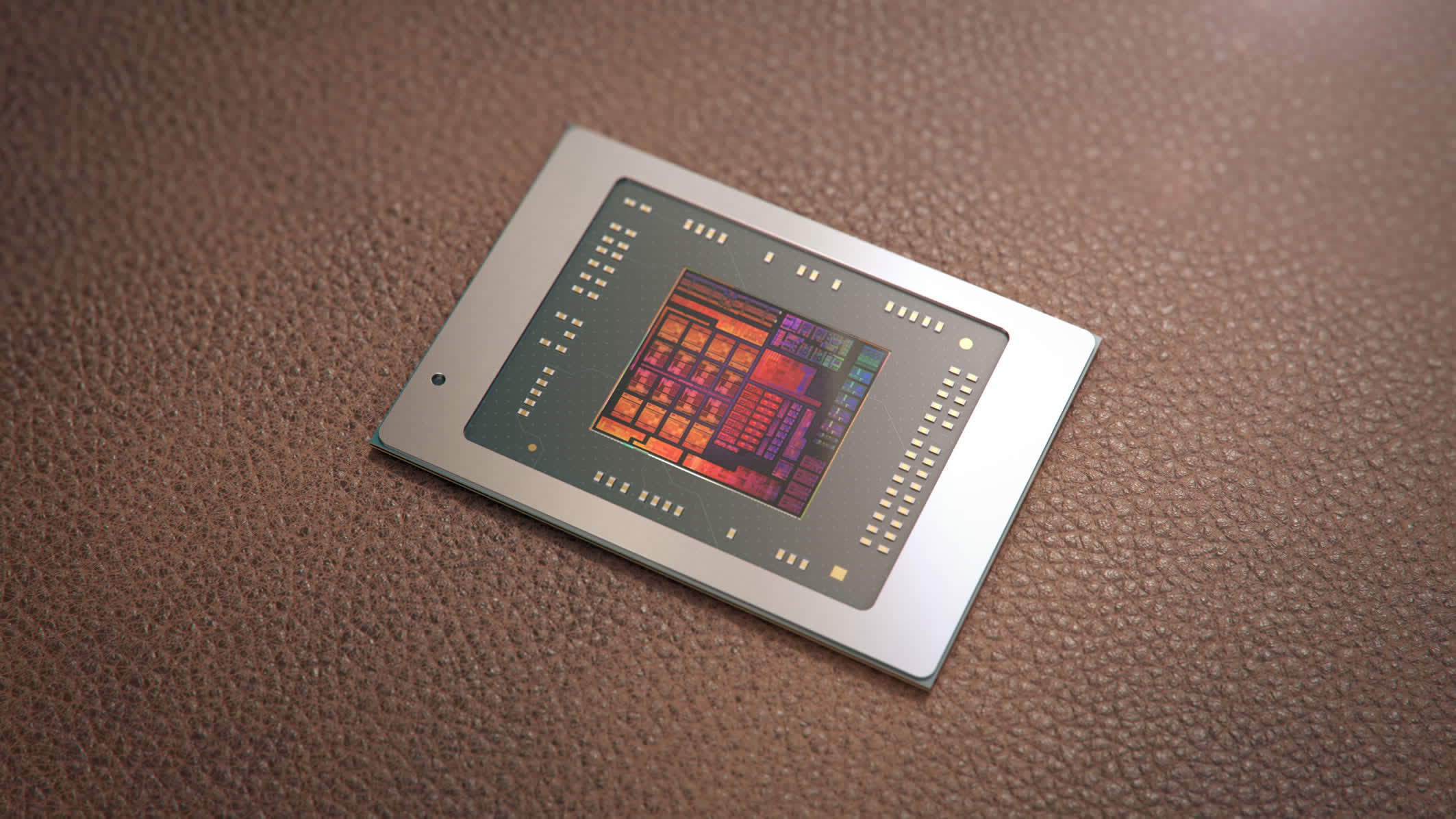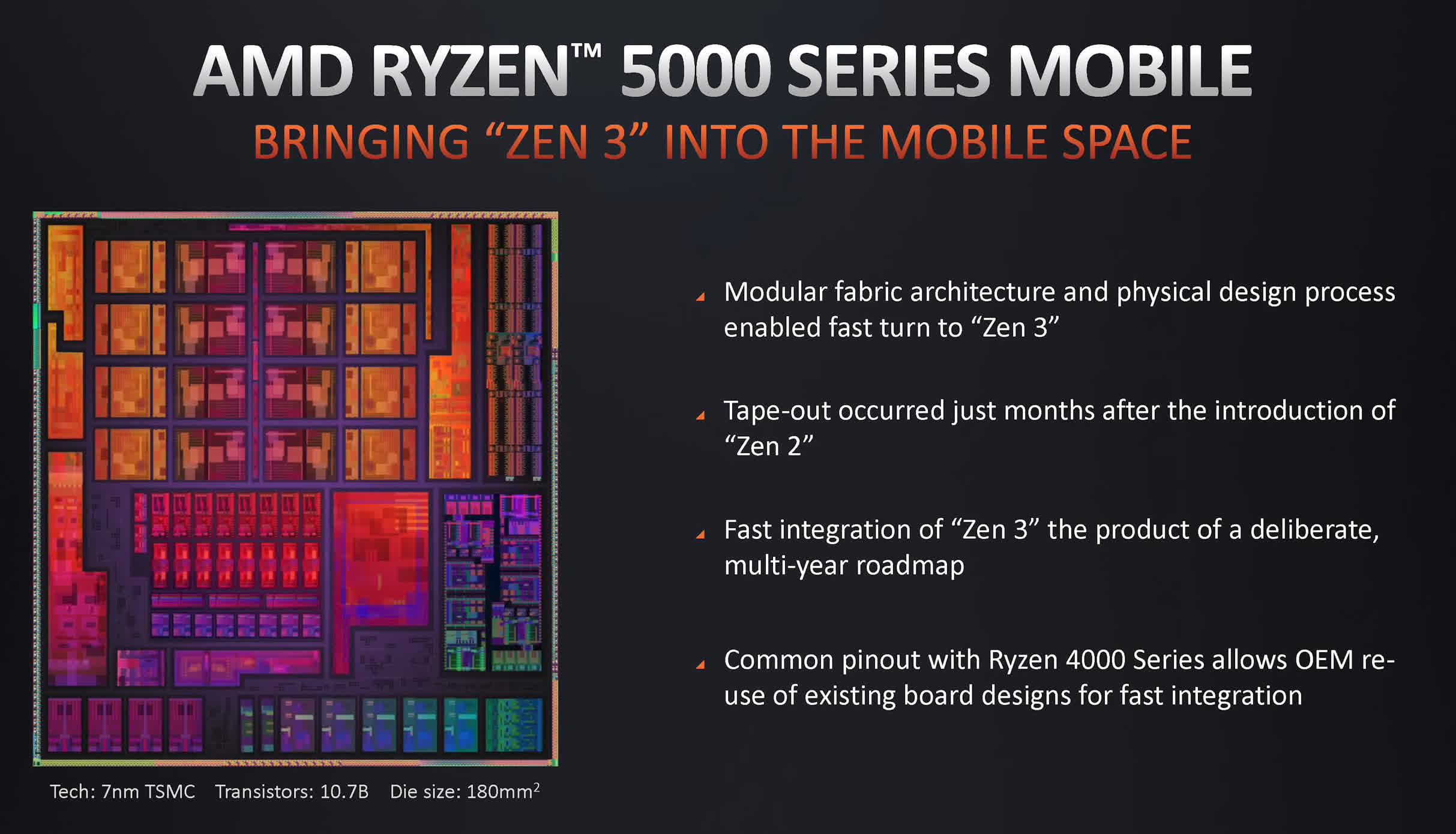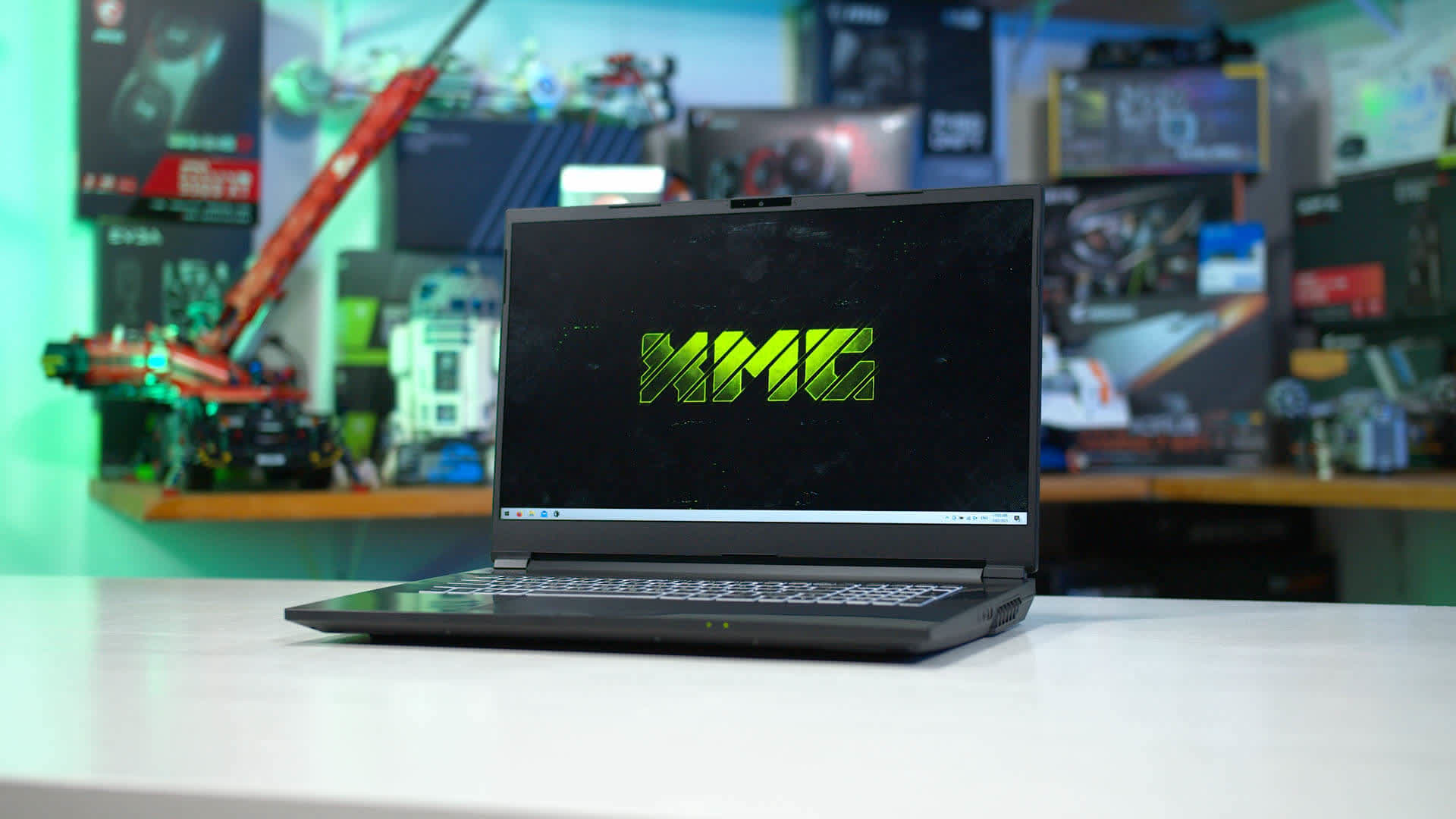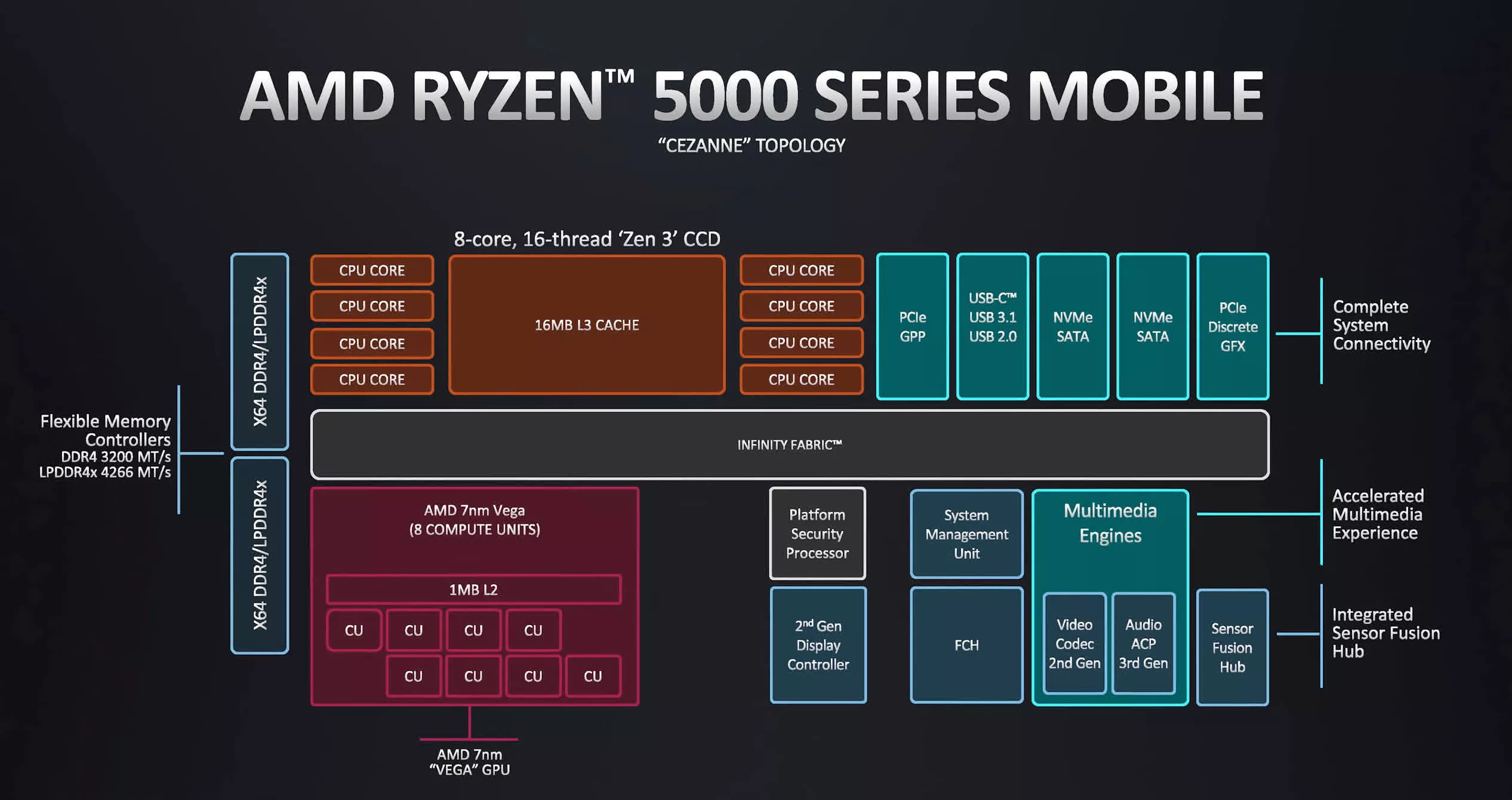The Ryzen 7 5800H is another new Zen 3-based APU that will form the backbone of AMD's gaming laptop platform and like the 4800H before it, we expect this to be the most popular processor in the series and found in a wide variety of laptop models.
This is the second Ryzen 5000 mobile APU that we've had hands on time with so far. We previously checked out the Ryzen 9 5980HS in the impressive Asus ROG Flow X13 ultraportable and found it to perform quite well, but in this review we'll shift our focus to this high-end mainstream laptop chip.
The Ryzen 7 5800H brings with it a unified 8-core CCX and double the L3 cache compared to the 4800H. Zen 3 also increases IPC for the CPU cores, and AMD is able to clock these chips slightly higher, despite using the same TSMC 7nm process node. Outside of the CPU though, the 5800H largely keeps the same feature set, from the memory controller to PCIe support.
The Ryzen 7 5800H features an unlocked 8 core, 16 thread design with 16 MB of L3 cache. On the CPU, we're looking at a 3.2 GHz base clock and 4.4 GHz boost, and it's really just in these clock speeds where the 5800H sits below the flagship 5900HX and 5980HX. On the GPU side we're getting an unlocked Vega design, with 8 compute units enabled clocked up to 2.0 GHz.

Compared to the last-gen 4800H, we observe the same 8-core CPU design with clock speeds increased by 300 MHz on the base clock, and 200 MHz on the boost. The increased IPC and extra L3 cache that will be providing the bulk of the improvements. We do get one extra GPU compute unit enabled, as well as a 400 MHz increase to frequency, however in most laptops that use the 5800H we suspect we'll be seeing discrete graphics added.
Our laptop test system used for benchmarking today is the same XMG Apex 17 we used to test the new GeForce RTX 3060 laptop GPU. This is a solid test platform as in its 'Entertainment' mode it runs as AMD expects: with a 5-8 minute boost period up to 54W, before dropping down to 45W long term, the default TDP for this processor. This is similar to how we saw the Ryzen 7 4800H operate in systems last year.
In addition to this 45W mode, there's also a performance mode that sustains 54W indefinitely, something to keep in mind if you are interested in buying an Apex 17 when they go on sale later this year. That will give you a small bump to the performance we're showing in this review, but as with all our laptop testing we normalize for power to keep a fair playing field between laptop CPUs.
The Apex 17 is sort of your classic mainstream laptop design aimed at mid-range to entry-level buyers that just want something basic with the best performance they can get for the dollar. There's plenty of cooling in here and if you so choose with a custom fan curve, the Apex can run near silently without losing any performance. There's an RTX 3060 with up to 115W of base power inside, 16GB of DDR4-3200 memory and a 1080p 144Hz display. This laptop configuration would be a good choice if you're a budget conscious shopper and want a performance-oriented design.
Benchmarks
Let's get into the performance charts and we'll start with Cinebench R20 multi-threading as usual. You're not going to sit towards the top of this chart unless you have an eight core design, and with the IPC benefits that Zen 3 brings, the 5800H is able to sneak its way into top position.

In terms of a generation-on-generation performance leap, the 5800H is just 8 percent faster than the 4800H, but across the board this allows Ryzen to extend its lead on Intel, with at least a 30 percent advantage over the Core i9-10980HK when both are running at 45W long term.

Where Ryzen 5000 sees the bulk of its gains is in single-thread performance. In Cinebench R20, the 5800H is a more substantial 15% faster than the 4800H, so that allows the 5800H to leapfrog Intel's 8-core 10th-gen processors into the leading position among 45W processors. However, only clocking up to 4.4 GHz maximum is insufficient for beating Intel's Tiger Lake designs, and while they are only 28W processors, the 1165G7 and 1185G7 both deliver better single-thread performance in this test.

Our Handbrake test takes ~30 to 60 minutes to complete on most modern H-series chips, and here the 5800H is 8% faster than the 4800H on average. This is a modest gain. However there is an incentive in these CPU encoding workloads to upgrade from Intel, where the 5800H is 63% faster than the Core i7-10750H, and 28% faster than the 10980HK.

Blender was the workload where we saw the smallest gen-on-gen gains for Zen 3. The 5800H is fast and delivers good performance in this multi-thread workload, but the gains compared to the 4800H are negligible. Relative to Intel processors, you'll see performance 30 to 70 better than equivalent H-series parts in the Core i7 range and above.


Code compilation is one of Ryzen's stronger workloads. In GCC compilation, the 5800H completed the workload 18% faster than the 4800H, putting it well ahead of Intel's equivalent processors. In Chromium compilation, the 5800H is 13 percent faster than the 4800H and not as dominant relative to Intel.

Matlab benefits significantly from Ryzen's increased IPC and higher L3 cache. Generation on generation, the 5800H is 19% faster in this application using the built in benchmark, which like in the Cinebench R20 single-threaded test, pushes AMD's laptop processor ahead of Intel's Core i9-10980HK for the first time.

In Microsoft Excel, we see AMD benefiting from increased cache, posting a 15% gain over the Ryzen 7 4800H. This is enough to have the 5800H outperform Intel's chips up to the Core i7-10875H, however the Core i9-10980HK remains the fastest chip by a small margin.

In the PCMark 10 Essentials test, which measures basic application performance like loading times and web browsing, the Ryzen 7 5800H performs well, topping the charts.
We're seeing a 9% improvement which is not huge, however this makes the 5800H about 5 percent faster than Intel's 10th-gen H-series parts. Realistically high end laptop CPUs from either brand will deliver solid all-round performance in basic apps.

In the applications test, the 5800H performs well, however the margins compared to Intel processors are slim that there is no real difference between a 5800H or 10875H for Office apps in practice. This CPU is a couple of percent behind the Core i7-1185G7 which is currently Intel's fastest processor for lightly-threaded apps.

In 7-Zip compression, increased IPC and more cache allows the Ryzen 7 5800H to take top spot on this chart. We're seeing some of the largest gains versus Ryzen 4000 here, with a sizable 25% performance increase. The 5800H ends up 6 percent faster than the Core i9-10980HK for multi-thread compression.

Decompression remains dominant for AMD, where the 8-core design can flex its muscles. Again, not the biggest gains versus the 4800H, and the 5800H is slightly slower than the 5980HS as this test is run entirely in the boost state, but either way you're left with great decompression performance with this processor.

Acrobat PDF exporting shows the 5800H neck and neck with Intel's H-series designs, although it is beaten in this heavily single-threaded workload by the Tiger Lake chips we've tested so far.
We do see a large gain over the previous-gen 4800H, with the 5800H being 19% faster here.

In Adobe Photoshop, the Ryzen 7 5800H is able to go toe-to-toe with Intel for the first time in the 45W class. Previously, this was an application where Intel had a clear advantage over Ryzen, but that's no longer the case with the Zen 3 upgrade. The 5800H is now equivalent to a 10980HK for performance.

Another strong result for AMD is running an instance of the warp stabilizer effect in Premiere. Largely single-threaded, the 5800H is 16% faster than the 4800H, and at least 20 percent faster than Intel's H-series designs. That gap does narrow when factoring in Tiger Lake, although the 5800H is still a couple of percent ahead of the 1185G7 in this workload.

We'll move now into some GPU accelerated workloads and the combination of a Ryzen 7 5800H and RTX 3060 GPU is very strong in DaVinci Resolve, matching the performance that was previously only on offer in the largest, highest-end Intel configurations.
We don't have any direct GPU equivalent results to give you in this workload just yet, but in a similar power class the 5800H and RTX 3060 combination easily outperforms previous designs that relied on high-end RTX 20 GPUs and Intel CPUs.

In Adobe Premiere using the Puget Systems export test, we see similar results. The 5800H in a mid-range configuration with an RTX 3060 is on par with higher-end Intel machines from last generation. Over time we'll get more clarity into exact matchups for Premiere exporting but the early results here are promising and show that allowing Ryzen to be paired with higher-end GPUs is a boon for content creators that want both strong CPU and GPU performance.

If you prefer running your encodes on the CPU rather than using GPU hardware acceleration, Ryzen is undoubtedly the best choice for Premiere. The 5800H completed our render test at least a minute faster than other configurations we've tested so far, and that includes previous-gen Ryzen designs, and a variety of Intel laptops.
Gaming Tests
We won't place a big focus on integrated GPU performance in this review for two reasons: 1) the graphics performance is very close to what we saw from the 4800H a year ago, and 2) because in the majority of Ryzen 7 5800H laptops, they'll be paired with some form of discrete GPU. However for those that are interested in how the integrated design fares...

In GTA V the 5800H delivers essentially the same performance as the 5980HS that we reviewed not that long ago, so the extra power available to use doesn't change the overall equation all that much.


In F1 2019, the 5800H is able to roughly match the Core i7-1165G7 for integrated graphics performance and delivers about 7% more FPS than the 5980HS. Nothing too amazing and again we don't expect many H-series designs to rely on the integrated GPU for gaming which are more often than not GPU limited.
If you're wondering how the Ryzen 7 5800H stacks up in discrete gaming performance, you should check out our review of the GeForce RTX 3060 laptop GPU which shows how this mid-range GPU from Nvidia fairs using this very processor.
Comparisons

The Ryzen 7 5800H sees a modest performance improvement over the Ryzen 7 4800H. The larger gains come in single-threaded performance, where the 5800H is ~15% faster. In multi-threaded workloads, you will also see gains, but less significant ones.

The 5800H is significantly faster than the Core i7-10750H in almost all workloads, whether that is single or multi-threaded. Intel's six-core mainstream processor is not very competitive, with the 5800H showing double digit percent better performance across the board. In many instances, the 5800H is over 50% faster.

The most direct competitor to the R7 5800H right now is the Core i7-10875H, Intel's 8-core H-series design. This CPU will receive an update to Tiger Lake later this year.
In some applications the 5800H and 10875H trade blows, such as in PCMark, Excel and Photoshop. But there isn't an instance where the 5800H is slower than Intel's design, and when we look at multi-thread performance, the 5800H is usually in the range of 50% faster.

AMD's 5800H is generally faster than Intel's flagship Core i9-10980HK, although it does depend on the workload and there are some instances where the 5800H and 10980HK deliver basically the same performance.
Multi-threading is a big strength of the 5800H, with the Zen 3 chip delivering 30% better performance in most instances. Lighter workloads see the 5800H within a margin of 5% faster or slower, so we'd call that to be even.

The 5800H isn't a true competitor to the Core i7-1185G7 as these parts sit in different power classes, however right now the Tiger Lake-based 1185G7 is Intel's best mobile processor for single threaded workloads.
The 5800H is not as fast as the 1185G7 here, although it does depend on the workload. If I had to put a number on it, I'd say the 5800H is roughly 5% behind the best Tiger Lake can do for single-threading, although with the 1185G7 only offering four cores, it's a strong win in favor of AMD for multi-threaded tests.
What We Learned
The Ryzen 7 5800H is a solid tune-up of AMD's H-series mobile CPUs designed for performance notebooks. AMD identified a weakness with their previous design – single-thread performance – and took it to the mechanic to swap out the Zen 2 architecture for Zen 3. The results are good, giving the 5800H the best performance on offer in its class in the vast majority of workloads.
The Ryzen 7 5800H is a solid tune-up of AMD's H-series mobile CPUs designed for performance notebooks.
From a pure numbers standpoint, the gen-on-gen performance gains are respectable but modest: 10% better multi-threading, 15-20% better single-threading. However, as a lot of the work was already done with the prior generation to bring AMD's line-up into a competitive position, the 5800H didn't need huge gains to be a success.
For those that already have a Ryzen 7 4800H system, we don't think there's much reason to consider an upgrade. However, with AMD extending their lead over Intel in multithreading, those with older laptops featuring other processors should see a substantial performance uplift moving to a Ryzen 5000 system. And that's not factoring in other platform upgrades you will likely get, in particular a faster discrete GPU.
If you're after a new performance-oriented laptop, we wouldn't considering an Intel 10th-gen laptop, even those with the Core i9-10980HK inside, because the Ryzen 7 5800H is simply faster watt for watt. The exception to this rule would be if the Intel laptop is more affordable for an equivalent configuration, or if the Intel laptop you're interested in has a niche feature that you require. Until this generation, Intel laptops were paired with faster GPUs in higher-end models, but with Ryzen systems now including all the way up to RTX 3080 graphics, that's no longer a key difference.
And while the Ryzen 7 5800H is the best mobile processor available in its price range right now, we are comparing AMD's newest generation to Intel's prior generation. Tiger Lake H-series chips with 8-core layouts are expected in the next few months, and it's definitely shaping up into an interesting battle given the strong gains Intel made in ultrabook-class CPUs. Those laptops are supposed to arrive in this or the next quarter, so it might pay off to wait a few months just to assess the competition and see if Ryzen 5000 supply is not an issue and you can actually purchase a new R7 5800H laptop at a reasonable price.





